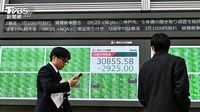On April 7, 2025, Asian stock markets experienced a dramatic crash, largely triggered by the United States imposing reciprocal tariffs on its trade partners. This move sent shockwaves through major financial markets, leading to significant losses across the region.
The Nikkei 225 index in Japan fell by 2,184 points, or 6.47%, settling at 31,596 points. This steep decline was so severe that trading of the Nikkei 225 futures and the Topix index futures was temporarily suspended after hitting the limit down, a situation that reflects the extreme volatility and panic in the market.
In South Korea, the KOSPI index also faced a heavy blow, dropping 133 points, or 5.42%, to close at 2,331 points. Similarly, the Australian S&P/ASX 200 index plummeted by 448 points, or 5.72%, finishing at 7,398 points. The downturn across these markets illustrates a widespread concern among investors regarding the implications of the U.S. tariffs.
The turmoil in the Asian markets is part of a larger global trend, as investors react to the trade policies implemented by the U.S. government. The tariffs, which are designed to counteract perceived unfair trade practices, have raised fears of retaliatory measures from affected countries, further complicating international trade relations.
In Japan, the opening of the Nikkei index was marked by a steep plunge that led to a trading halt at the Osaka Exchange, reflecting the panic among traders. Reports indicate that the Nikkei index fell by over 2,500 points at one point during the trading session, an unprecedented drop that underscores the seriousness of the situation.
The situation is particularly alarming for investors who are already grappling with uncertainties brought about by global economic conditions. The imposition of tariffs has been a contentious issue, with critics arguing that such measures could lead to a trade war, adversely impacting economies worldwide.
Market analysts are closely monitoring the developments, as the fallout from these tariffs could reshape trade dynamics in the Asia-Pacific region. Some experts warn that if the U.S. continues down this path, it could trigger a domino effect, prompting other nations to implement similar measures, thereby escalating tensions and instability in global markets.
As the situation unfolds, investors are advised to remain vigilant and consider the long-term implications of these trade policies. The volatility seen in the markets on April 7 serves as a stark reminder of how interconnected the global economy is and how quickly conditions can change based on government actions.
The repercussions of the U.S. tariffs are likely to be felt beyond the immediate stock market reactions. Economists suggest that the long-term effects could impact consumer prices, supply chains, and overall economic growth in the affected regions.
In summary, the events of April 7, 2025, highlight the fragility of the current economic landscape. With major stock indices in Asia facing significant declines, the potential for a broader economic fallout looms large. Investors and policymakers alike will need to navigate these turbulent waters carefully as the implications of recent trade actions continue to unfold.







